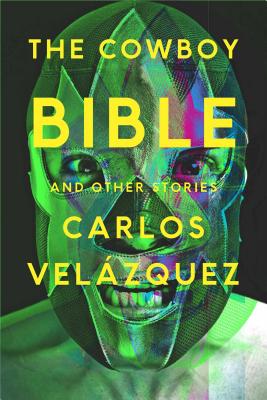Carlos Velázquez, The Cowboy Bible (Restless Books, January 2016). Translated by Achy Obejas—review by Selina Aragón, Spanish Social Media Manager

The Cowboy Bible (La Biblia Vaquera) is Carlos Velazquez’ second book, which contains two fictional and three nonfictional stories, plus two neither-fiction-nor-nonfiction texts and two epilogues. They are all set in the land of PopSTock!, for which there is a map at the beginning of the book.
The Cowboy Bible is also a character that metamorphoses into other characters (The Western Bible, The Cowgirl Bible, etc.) who live and act in different times and spaces but share the same talent for entering the dark alleyways of life. Despite their morally questionable actions, wrestlers, drunkards, DJs, street-food sellers, whose “legendary” deeds go from writing songs about drug dealers to crowning a Queen of Piracy in reality shows, become underground heroes equivalent to Mexican popular culture icons:
“I went dressed as a Cartesian seminarist. As soon as the guy in charge of composing the soundtrack to reflect the wrestling audience’s passions saw me take a step forward the ring, he put on a song by the great Sonora Dinamita.”
In her translation, Achy Obejas preserves the smoothness of the text, in spite of the frequently jarring references and, often confusing variations of the Cowboy Bible. The book turns into a person, and the person is a reminder of the book; wrestling turns into DJ-ing; guitar brands, razors in the art of shaving:
“Handling an acoustic razor is not the same as handling an electric one. Check out the style. […] Some people say the key is the tube amp, others lift the strings with their hands as they arpeggio or use a homemade instrument.”
Obejas brilliantly manages to transmit the blunt succinctness of Velazquez’ narrative without losing the Mexican folklore. In La Biblia Vaquera, the narrative voice’s language sways between Spanish, English, Spanglish and other made-up words that are slight modifications of words in Spanish. The Cowboy Bible‘s translation weaves English in with terms and names in Spanish to keep the rhythm of the narrative flowing.
In English or Spanish, The Cowboy Bible is a punch in the face from a wrestler who is also a DJ, a dealer, or a mezcal drinker; a punch that makes you lose your ground. It knocks you out only to bring you back into reality—the Mexican modern reality. It defies whoever dares to read the stories in it and get to know each one of the Bibles.
***
Sony Labou Tansi, The Shameful State (Indiana University Press, January 2016). Translated by Dominic Thomas—review by Omar El Adl, Editor-at-Large Egypt

“There aren’t a thousand ways of being in this world,” says Colonel Martillimi Lopez in The Shameful State (1981) by Sony Labou Tansi, and translated by Dominic Thomas. Despite Tansi’s turgid representation of a tyrant, his novel disagrees: there are a thousand ways of being, and a thousand ways of political organization that are not the African newly-independent postcolonial state.
But under Colonel Lopez’s despotic rule, there is only one way. In Tansi’s view, colonialism has seeped into a singular conception of being that has been internalized by Lopez’s citizens and ministers, dictating their “one” state of being. This state becomes a metonym for the State, the “shameful state (by which I mean state as condition) in which we find ourselves.”
The shameful state problematizes notions of independence and progress, as most atrocities in Tansi’s State are committed by the government—a symbol of organized political life. Although Alain Mabanckou’s foreword in this first English translation likens Tansi to Mario Vargas Llosa and Gabriel Garcia Marquez, Tansi’s deconstruction of the postcolonial State is an interrogation of the logic behind larger political organization rather than any single articulation gone wrong.
Tansi resorts to the corporeal in his violence to the French language, in a manner that carries urgency and an emphasis on materiality through a manic voice of narration. This corporeality is exemplified in Lopez’s imposing hyper-masculinity, virility and sexual violence in battle; atavistic characteristics that bear a resemblance to figures like Mobutu Sese Seko. Passages such as “the corpse continues to beg him: please do something to get me out of this shameful situation, his eyes bulging, fresh bloody tears, his tongue hanging out…” as well as constant references to Lopez’s hernia as an independent entity, counter disembodied lofty notions of postcolonial struggle.
Dominic Thomas’ translation retains some of Tansi’s language—which Tansi describes as “ill-gotten words”—in odd formations and puns that he has elected not to explain in footnotes for fear it would render the book unreadable. Thomas’ explanation may be reasonable, though it should be noted that little context on Tansi’s use of French has been provided, with very few exceptions. There are some coinages that Tansi uses such as Lopez’ mother, titled National Mom, which are imbued with a bureaucratic sterile wording that Thomas sometimes misses, in favor of more readable versions. Otherwise, Thomas’ translation conveys a vitality particular to Tansi’s writing and a sense of his linguistic dexterity.
The Shameful State appears a direct condemnation of despotic rule in Africa, but is more an urgent call to reevaluate political contemporaneity and notions of progress. Entering the world like Lopez came in “holding his big greasy herniated balls and exited still holding onto them” is a choice Tansi believes to be a source of shame we must avoid.
***
Peter Sichrovsky, Verklempt (DoppelHouse Press, January 2016). Translated by John Howard—review by Yardenne Greenspan, Editor-at-Large Israel

Peter Sichrovsky has spent his life investigating and analyzing the lives of Holocaust survivors, Israeli Jews, and descendants of Nazi party members. He has formed alliances with victims and victimizers with the sole practical and admirable purpose of understanding and exposing human emotion to the deepest degree possible.
In Verklempt, Sichrovsky depicts fictional accounts founded upon his real life encounters and interactions. Each of the eleven stories in this collection revolves around characters damaged by World War II and the Holocaust—Jewish and gentile, either directly involved in the war or by association. These people are improperly equipped to cope with the world around them, and find themselves losing all control of their bodies, souls, and fates. In some of the stories they are eternal victims; in others, their harrowing experiences have turned them cold and violent toward others.
One story has a Jewish survivor celebrating his seventieth birthday by impregnating his only daughter’s lesbian lover, so that he may have a grandchild at any cost. Another features a breakup between two Jewish teenagers following the discovery that, during the Holocaust, one’s grandfather was a capo who brought on the death of the other’s. Many of the stories feature Jewish men, survivors or the descendants of survivors, who find themselves back in Austria, trapped in dysfunctional marriages to gentile women. No matter how much they tried to defend their choices to their families, claiming and convincing themselves that the past is behind them, it always rears its ugly head: through memory, trauma, child raising, sex. All aspects of life end up, in spite of the characters’ best efforts, as mere reflections of the past.
John Howard’s translation is clear, clean, and straightforward. His word choices are simple and direct, resisting the temptation for sentimentality that such subject matter holds. I was especially impressed by the way he conveyed the different patterns of speech that characterize people of different ages and geographical descents. There is no confusing his elderly Austrian aunt with his Brooklynite Jewish mother, for instance.
Though I found the stories moving and engaging, I cannot say I’m a fan of Sichrovsky’s prose. I often felt that he set up such intriguing narratives and metaphors (a man dying of asphyxiation during an out-of-wedlock tryst with a fellow daughter of survivors; a Jewish family left to fend for themselves in Majorca while their gentile friends enjoy the comfort of a beach house), only to then drive his point home in the most literal way possible—through direct confessions expressed either in dialogue or inner monologue, too often “explaining away” the heart of the matter. To me, the stories would have been that much more powerful if I was left to understand the significance of these characters’ obtuse and self-destructive life choices on my own.

